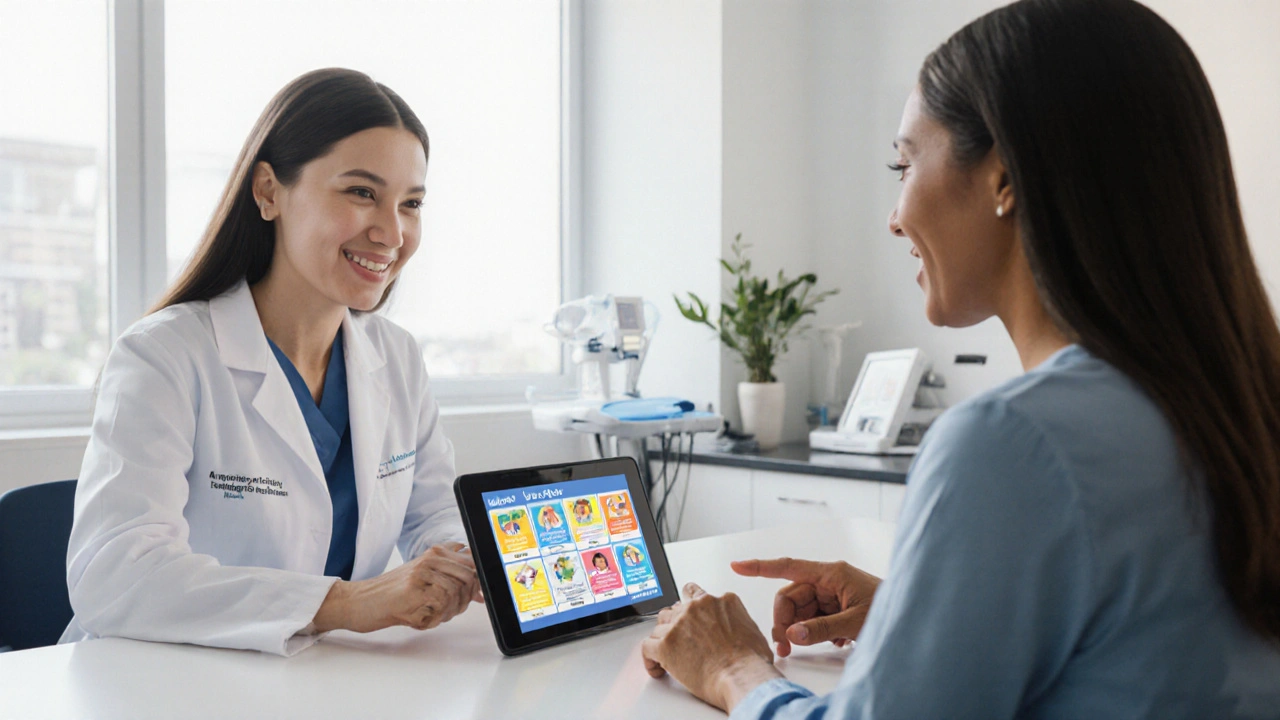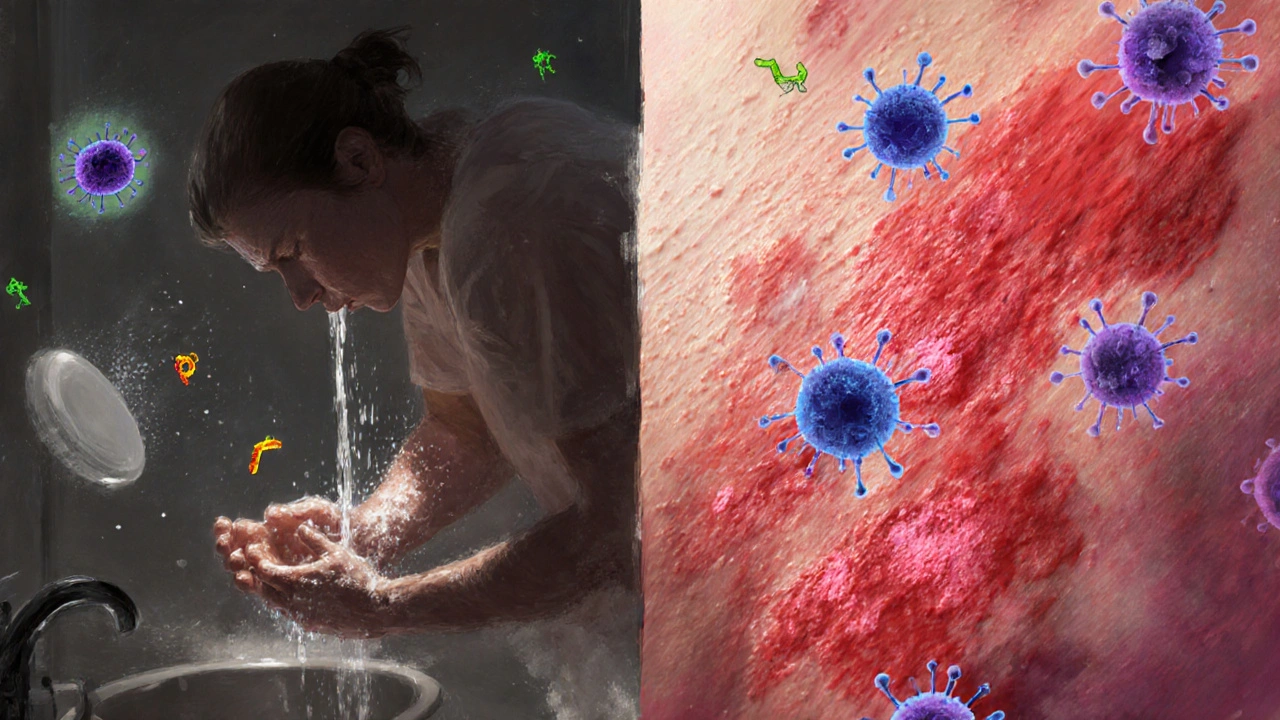
Plaque psoriasis is a chronic autoimmune skin condition that produces raised, red, scaly patches on the skin. It accounts for about 80% of all psoriasis cases and can appear at any age, though it commonly starts in the twenties or thirties.
Ever heard that plaque psoriasis is just a "skin allergy" or that it’s contagious? Those ideas are among the top ten myths that keep patients misinformed and sometimes hesitant to seek proper care. Below we break down each myth, present the science‑backed fact, and offer practical tips to navigate life with psoriasis.
Many assume that washing less often or not keeping skin clean triggers plaques. In reality, psoriasis is driven by an autoimmune disease where the immune system mistakenly attacks healthy skin cells. Cleanliness does not prevent the immune cascade that leads to plaque formation.

The immune system releases cytokines that speed up the growth of keratinocytes, the cells that make up the outer skin layer. This rapid turnover creates the characteristic thick scales. Good skin care can soothe irritation but won’t stop the underlying immune response.
Friends sometimes keep their distance, fearing they might "catch" the rash. This fear is unfounded. Psoriasis cannot be spread through touch, sharing towels, or any other form of contact.
Because it is an autoimmune condition, the cause lies within the individual's immune system, not an external pathogen. You can safely hug, shake hands, or share a couch with someone who has plaques.
It’s a common belief that children are immune. However, pediatric cases represent about 10% of all psoriasis diagnoses.
When children develop plaques, early treatment is crucial to minimize psychological impact and reduce the chance of developing psoriatic arthritis later in life.
Stress does flare plaques for many, but it isn’t the only player. People often blame a stressful week for a sudden rash, ignoring other contributors.
Triggers include infections (especially strep throat), skin injury (the Koebner phenomenon), certain medications, and lifestyle factors like smoking or heavy alcohol use. Stress is just one piece of a larger puzzle.
Social media is full of "miracle" diet plans promising clear skin. While a balanced diet supports overall health, no single food or supplement eradicates plaques.
Research shows that losing excess weight can improve treatment response, and omega‑3 fatty acids may reduce inflammation modestly. However, diet should complement, not replace, medically approved therapies.
Some patients hear “steroid” and think of harmful side effects, so they skip prescribed creams.
When used as directed, topical corticosteroids are a mainstay for mild‑to‑moderate plaques. Intermittent use and proper potency selection minimize risks like skin thinning. Your dermatologist will tailor the regimen to your skin type and plaque severity.
Phototherapy uses UV light, leading some to fear it will cause skin cancer.
Controlled narrow‑band UVB phototherapy has a strong safety record. Studies tracking millions of treatment sessions report a very low increase in skin cancer risk, especially compared to the benefits of clearing extensive plaques.
Biologics are often called “new” and thus risky.
Biologic therapy targets specific immune pathways (like TNF‑α, IL‑17, or IL‑23). Since their FDA approval in the early 2000s, they have transformed moderate‑to‑severe psoriasis care, offering high clearance rates with a well‑characterized safety profile. Regular monitoring ensures any side effects are caught early.
People sometimes view plaques as an isolated issue, ignoring broader health implications.
Patients with plaque psoriasis have an increased risk of cardiovascular disease, metabolic syndrome, and depression. Managing skin symptoms often goes hand‑in‑hand with addressing these systemic concerns.
Cost worries lead many to settle for over‑the‑counter creams that provide minimal relief.
Many health systems offer patient assistance programs for biologics and phototherapy. Community clinics often provide low‑cost topical options and counseling. Speak with a dermatologist about sliding‑scale or generic alternatives before giving up on effective care.
| Myth | Fact |
|---|---|
| Poor hygiene causes plaques. | Psoriasis is an autoimmune disease driven by immune‑mediated skin cell growth. |
| Psoriasis is contagious. | It is not transmissible; the cause is internal. |
| Only adults get it. | Children can develop plaques; early treatment matters. |
| Stress is the only trigger. | Triggers include infections, skin injury, meds, smoking, alcohol. |
| Diet alone cures it. | Diet supports health but cannot replace medical therapy. |
| Topical steroids are unsafe. | When used correctly, they are effective and low‑risk. |
| Phototherapy causes skin cancer. | Controlled UVB phototherapy has a low cancer risk. |
| Biologics are experimental. | Biologics are FDA‑approved, highly effective for moderate‑to‑severe cases. |
| Psoriasis only affects skin. | >It raises risk for cardiovascular disease, arthritis, depression. |
| Unaffordable without insurance. | Assistance programs and low‑cost options exist. |
Psoriasis is a chronic condition, so it rarely vanishes completely without treatment. However, many people experience long remission periods where plaques are minimal or absent, especially when their triggers are well‑managed.
Currently, no cure exists. Treatment aims to control symptoms, clear plaques, and reduce the risk of comorbidities. Ongoing research into immune pathways holds promise for future breakthroughs.
Most patients see noticeable improvement within 8‑12 weeks, with maximal clearance often reached by 6 months. Response can vary based on the specific biologic and individual immune profile.
During phototherapy sessions you’ll receive measured UV exposure, but you should still protect uninvolved skin with sunscreen. Sunburn can trigger the Koebner phenomenon, worsening plaques.
Aloe vera gel, oatmeal baths, and modest omega‑3 supplementation can soothe symptoms, but they are adjuncts-not replacements-for clinically proven treatments.
Understanding the truth behind the most common misconceptions empowers you to make smarter choices, stick to effective therapies, and live confidently with plaque psoriasis. Remember, the journey is personal-what works for one person may need tweaking for another, so keep the conversation open with your healthcare team.
14 Responses
First of all, thank you for putting together this myth‑buster; clarity is essential when dealing with a condition as pervasive as plaque psoriasis.
Myth number one-poor hygiene causes plaques-is simply unfounded; the skin barrier dysfunction stems from an overactive immune response, not from a lack of washing.
Scientific literature, including the National Psoriasis Foundation, confirms psoriasis is an autoimmune disease where T‑cells mistakenly attack healthy skin cells, accelerating their turnover.
This explains why plaques appear even on meticulously clean skin.
Myth two-psoriasis is contagious-also falls flat; no viral or bacterial agent is transmitted between individuals, which is why it does not spread through casual contact.
Even though lesions are visible, the underlying pathology is internal and genetic‑environmental, not communicable.
Furthermore, the claim that only adults suffer is outdated; pediatric psoriasis affects up to 10 % of children, and early intervention can prevent severe disease progression.
Stress, while a notable trigger, is not the sole culprit; infections, skin injury (Koebner phenomenon), certain medications, smoking, and alcohol consumption are all documented precipitants.
Regarding diet, no single food regimen cures psoriasis, though maintaining a balanced diet rich in omega‑3 fatty acids and antioxidants can support overall skin health and potentially lessen flare‑ups.
Nonetheless, dietary changes should complement, not replace, clinically approved therapies such as topical steroids, phototherapy, or biologics.
It is also vital to debunk the notion that plaques can be “peeled off” without medical supervision; aggressive physical removal can lead to infection and scarring.
Proper treatment plans are individualized, often involving dermatologists who assess severity, comorbidities, and patient preferences.
Patients should be encouraged to adhere to prescribed regimens and communicate any side‑effects promptly.
Education empowers patients to distinguish myth from fact, leading to better management and quality of life.
In summary, plaque psoriasis is a complex, immune‑mediated condition, not a hygiene issue, not contagious, not limited to adults, and not cured by diet alone.
Congratulations on a concise presentation; the facts are articulated with precision, and the myth‑dispelling format is both engaging and educational.
I appreciate how each myth is directly countered by clear, evidence‑based statements.
This approach will undoubtedly aid readers in separating misconception from medical reality.
Let us, for the sake of clarity, address the grammatical inaccuracies that frequently accompany discussions of psoriasis; the term “plaques” should be preceded by the definitive article “the,” as in “the plaques,” because it refers to specific lesions.
Moreover, the phrase “psoriasis is contagious” is a categorical falsehood, and it must be unequivocally labeled as a myth, not a hypothesis.
When citing scientific sources, one ought to employ proper citation formats-APA, MLA, or Chicago-rather than informal parentheticals.
In addition, the usage of “diet alone cures it” is a classic example of an absolute statement, which is logically invalid without supporting empirical data.
Finally, the verb “trigger” should be pluralized when referring to multiple stimuli, i.e., “triggers include infections, stress, and medications.”
By adhering to these linguistic standards, the educational impact of the article is enhanced considerably.
Spot on with the nitpicking, but the core message remains crystal clear-psoriasis isn’t a hygiene issue, and we all benefit from cutting through the jargon.
Honestly, this myth‑buster is the drama I needed to feel something!
While the emotional response is noted, the factual correction is that psoriasis prevalence is estimated at 2‑3 % globally, underscoring the importance of accurate public awareness.
Great job debunking these myths-now if only we could convince people that “reading the comments” isn’t a cure for psoriasis, the world would be a better place.
Wow, you really think sarcasm solves anything?
People need to know psoriasis is an immune condition not a social stigma and treatment works best with a holistic approach.
Totally agree-psoriasis is real and we gotta fight the stigma while supporting each other's journeys!
Stay positive, keep up with your treatment plan, and remember every small step counts toward clearer skin.
Sure, because “staying positive” magically makes immune cells behave-nice try, but let’s keep the science real.
In the grand tapestry of human existence, the skin serves as both barrier and canvas. To misconstrue psoriasis as mere vanity is to ignore the profound interplay of genetics, environment, and psyche, a dilemma that demands both compassion and rigorous inquiry.
Ah yes, because pondering the metaphysics of keratinocytes will surely cure the plaques-though a good laugh might lighten the flare.